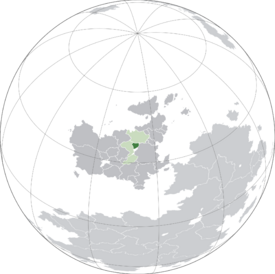User:Forvana/Sandbox1
Republic of Auzance Republique Ôtuzance | |
|---|---|
|
Flag | |
| Motto: "Nos mårtchîons eshonnes" "We march together" | |
 | |
| Capital and largest city | Cestiène |
| Official languages | Autuzian |
| Ethnic groups | Autuzian, Gaullican |
| Demonym(s) | Autuzian |
| Government | Federal semi-presidential council republic |
• Chancellor | Houbêrt Louxhî |
• Prime Minister | Catrene Burnot |
| Legislature | Tchambe |
| Independence from Gaullica | |
• Declared | 14 November, 1932 |
• Current constitution | 31 December, 1971 |
| Area | |
• Total | 60,000 km2 (23,000 sq mi) |
| Population | |
• 2020 estimate | 14,000,000 |
• 2018 census | 14,000,000 |
• Density | 233.33/km2 (604.3/sq mi) |
| GDP (PPP) | 2018 estimate |
• Total | $xbn |
• Per capita | €x |
| GDP (nominal) | 2020 estimate |
• Total | $462 billion |
• Per capita | €33,000 |
| Gini (2018) | low |
| HDI (2018) | very high |
| Currency | Autuzian keuve (ƙ) |
| Time zone | UTC-1 (Cestiène Standard Time (CTS)) |
• Summer (DST) | UTC0 (Cestiène Summer Time (CTE)) |
| Driving side | right |
Auzance (Autuzian: Ôtuzance), officially the Republic of Auzance (Autuzian: Republique Ôtuzance), is a sovereign state in central Euclea. The nation shares land borders with Valduvia to the north, Gaullica to the east and East Miersa to the west. Auzance's capital, and largest city, is Cestiène. Auzance is the nth most populous state in Euclea with a population of 14,000,000, and its nth largest state, spanning 60,000km². Auzance also borders unknown lake to its south; this coastline harbours a significant portion of Auzance's population and urban regions, including its capital.
Auzance has been a socialist state governed as a federal council republic since soon after its declaration of independence in 1932, however has been more representative of this since the 1948 coup d'état. Auzance is a semi-presidential republic, with a high level of separation of powers; its head of state has been Chancellor, Houbêrt Louxhî, since 2019, while its head of government has been Prime Minister Catrene Burnot since 2019. The legislature, the Tchambe, is scrutinised by the Constitution (Mwaisse Lwè), which is upheld by the High Court (Hôt-Cour). The nation, having been a de facto democracy since its inception, democratised rapidly in the 1970s; this has enabled it to gain a status in recent decades as being highly democratic, scoring highly on civil rights indices.
